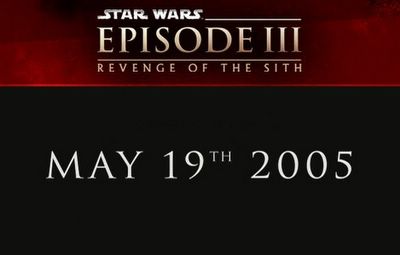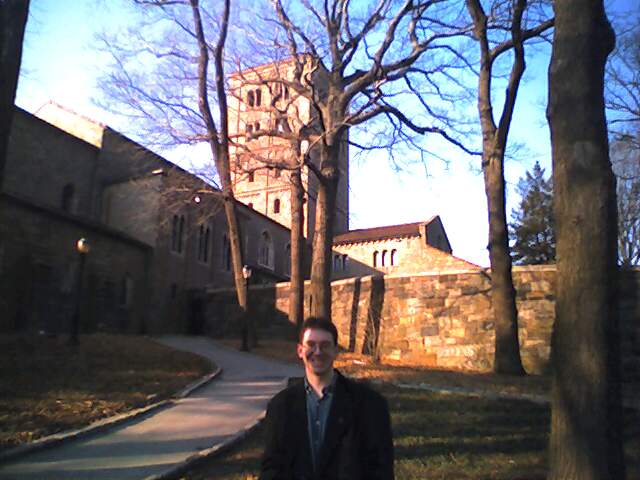Books: The Star Wars Trilogy (Part I)

First off, I'll admit that I am a dork. I am really looking forward to Star Wars III (VI): Revenge of the Sith.
So today this blog shall debut a new regular feature, the book review. A long time ago, in a neighborhood somewhat far away, I walked into a book store and bought the Star Wars trilogy. It must have been close to ten years ago. When I started reading it, I just couldn't get through it. Part of it was the big words (I didn't say I was a smart dork) and another was that the writing just didn't compare to the visuals.
Recently I decided to pick it up again, and I'm glad I did. This time, my expectations were to brush up on things before seeing the new movie, and also to see what things were taken out of the original trilogy.
Surprisingly enough, while Return of the Jedi was the less appealing film of the original three, it was the better book. I recommend you read it sometime...but only after you see the next movie (I'll get into that later).
So here is my review of the Star Wars trilogy, in books (Star Wars, by George Lucas; The Empire Strikes Back, by Donald F. Glut; and Return of the Jedi, by James Kahn). I'm going to assume that you're familiar with the Star Wars movies, and thus will focus on the things in the books that were different, for better or for worse.
The first post will be on Star Wars, later called "A New Hope".
STAR WARS

Not much extra can be found from reading the Star Wars book. It is very close in its rendition to the movie, with a few notable exceptions.
The first one is the character of Biggs Darklighter, who is given a cameo at the end of the New Hope movie. This is the man who gladly greets Luke shortly before the two, along with other rebel pilots, attack the Death Star. Biggs is killed by Darth Vader in the movie.
We are told little of him in the movie, but he is introduced early in the book as Luke's best friend on Tatooine. For some reason, probably time, his scenes were cut out of the movie (a description of the scenes, as well as a section of the script copy, may be found here.
Biggs has come by to say good-bye to his friend, and to recruit him to the rebellion. Luke, deferring to the wishes of his uncle, declines. Echoing Ben Kenobi and Yoda later on, Biggs retorts, "someday you're going to have to learn to separate what seems to be important from what really is important." Biggs leaves the next day.

Another notable difference is Ben Kenobi's description of the Force, one that is refuted in the Episode I movie. In Episode I, and the website, the Force is quantified by midi-chlorians, living beings that flow in the bloodstream of Jedis. It is a very scientific way of dealing with something that was considered more mystical. It also leads to Internet dorks to ask questions about things like blood transfusions, and if someone can get Jedi powers through them.
The Episode IV (Star Wars) book handles the force much more differently. In Ben Kenobi's words, the Force...
"[I]s an energy field and something more, an aura that at once controls and obeys. It is a nothingness that can accomplish miracles. No one, not even the Jedi scientists were able to truly define the force. Possibly no one ever will. Some times there is as much magic as science in the explanations of the force. Yet what is a magician but a practicing theorist?"
It would have been better for George Lucas to keep it that way. But let's face it, Episode I as a movie was a disaster anyway, for more reasons than that.
In addition, a reference that really jumps out of me was this odd little statement made by a guy called "Blue Leader," who walks up to Luke shortly before the attack on the Death Star and says, "I met your father once when I was just a boy, Luke. He was a great pilot. You'll do all right ou there. If you've got half your father's skill, you'll do a damn sight better than all right."
This leads me to believe that the average rebel soldier has no idea Anikan turns into Darth Vader, otherwise Blue Leader would have walked over to him and said, "your father is a real sunavabitch..."

The most notable reference to Lucas' vision for the "first three" movies however, comes from the book's Prologue. It states that Senator Palpatine:
"[C]aused himself to be elected President of the Republic. he promised to reunite the dissafected among the people and to restore the remembered glory of the Republic.
"Once secure in office he declared himself Emperor, shutting himself away from the populace. Soon he was controlled by the very assistants and boot-lickers he had appointed to high office, and the cries of the people for justice did not reach his ears."
Interesting.
This book does not even come close to bringing you the action and the flavor of the movie, nor does it really add much to it. This was very dissapointing, and halfway through it I was reminded why I had stopped reading it long ago.
But I liked the description of the force in this novel, and the background on Biggs made the scene near the end of the movie make a whole lot more sense.
Coming next: The Review of the Empire Strikes Back, the book.
RELATED LINKS:
More Books
My Episode II Review
My Episode III Review
Episdoe II Review
Episode III Review
What is Star Wars Cannon?
Star Wars and Moral Issues
Return of the Jedi Novel References
The Original Star Wars script?

I can't wait!



2 Comments:
why must every post concerning Star Wars begin with an apology?
Because it's one thing to like, or even love the movies.
It's another thing to spend hours researching and writing about them.
But I do get your point!
Post a Comment
|<< Home